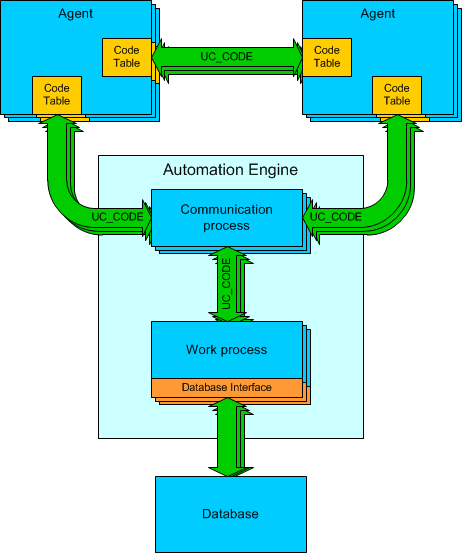
|
Documentation Tabs |

CodeTable |
Connection |

|
 Code Table - Usage
Code Table - UsageThe following document informs about the character sets AE uses system internally.

AE basically uses UC_CODE for the data traffic between the Automation Engines and agents and between the agents themselves.
| Automation Engine | CodeTable |
|---|---|
| Windows | UC_CODE |
| UNIX | UC_CODE |
Data is saved in the databaseA database is an organized collection of data including relevant data structures. in accordance with the settings made in the database interface. Be careful when installing the database and configuring the database interface that the correct character set and the correct code conversion are set.
The CodeTable name used an agent by default can be defined in its INI file. CodeTable names are assigned with the parameter UC_HOST_CODE= in the section [VARIABLES].
When the agent logs on to the Automation Engine, the Automation Engine stores the CodeTable names for this particular agent in its internal host table. The Automation Engine reads the CodeTable from client 0000 and transfers it to the agent. The agent then uses this CodeTable for all jobs and file transfers which do not require different CodeTables.
CodeTables used by agents by default must always be stored in client 0000. Modifications made in these CodeTables will take effect after a re-logon to the Automation Engine.
Default CodeTables of Agents
| Agent | CodeTable |
|---|---|
| BS2000 | BS2000_DEUTSCH |
|
Database |
UC_CODE |
|
GCOS8 |
UC_CODE |
|
JMX |
UC_CODE |
|
MPE |
UC_CODE |
| NSK | UC_CODE |
|
Oracle Applications |
UC_CODE |
|
z/OS |
IBM_3270_INTERNATIONAL |
| OS/400 | EBCDIC_00273 |
| PeopleSoft | UC_CODE |
| SAP | UC_CODE |
|
Siebel |
UC_CODE |
|
UNIX |
UC_CODE |
| VMS | UC_CODE |
| Windows | UC_CODE |
If a particular CodeTable was not specified for a job, the default CodeTable of the agent used for executing this particular job applies. The Automation Engine sends the job data (JCL) using UC_CODE to the agent. The agent converts the JCL (if required) according to the target system's character set. In doing so, the agent uses the default CodeTable sent to it by the Automation Engine during the login procedure. The job is saved in the defined working directory. After job execution, the agent reads the report from this file. The report is converted in accordance with the character set of UC_CODE and sent to the Automation Engine.
If a job does not use the default CodeTable - but instead, for example, an ASCII character set for DOS outputs in Windows - this CodeTable is first sent to the agent. In doing so, the Automation Engine starts searching this CodeTable in the local client. If this CodeTable is not found there, the CodeTable of client 0000 is used. This CodeTable, however, is only valid temporarily and is exclusively used for this particular job's JCL and report.
If particular CodeTables were not specified for file transfers, the default CodeTables of the involved agents apply. The agent converts the source file to UC_CODE (if required) and sends it to the partner agent. It is then converted from UC_CODE to the character set of the particular agent's default CodeTable and written to the target file.
For file transfers, a CodeTable can explicitly be specified for sending and/or receiving agent(s). This is essential when the contents of the file to be transferred do not comply with the default CodeTables of the involved agents. The Automation Engine sends the required CodeTable to the agent so that it can correctly convert the file's contents. Explicitly specified CodeTables are only valid on a temporary basis and for the current file transfer. Subsequent file transfers and jobs are not affected.
It is also possible to create and use individual CodeTables for particular requirements. If these are stored in the local client, they must not have the same object names as the CodeTables in the system client.
Refer to the System Overview to see which CodeTables are used by the individual agents by default.